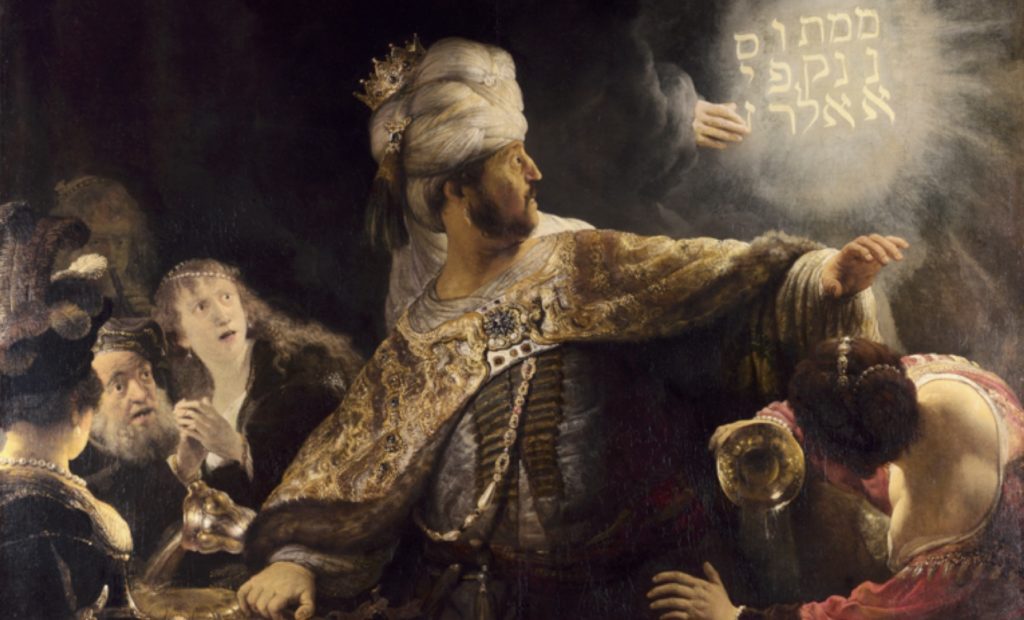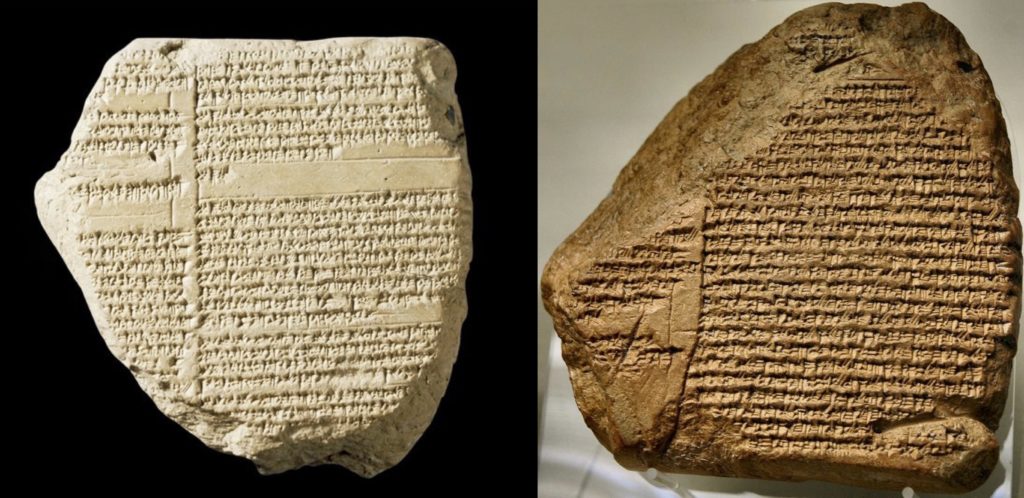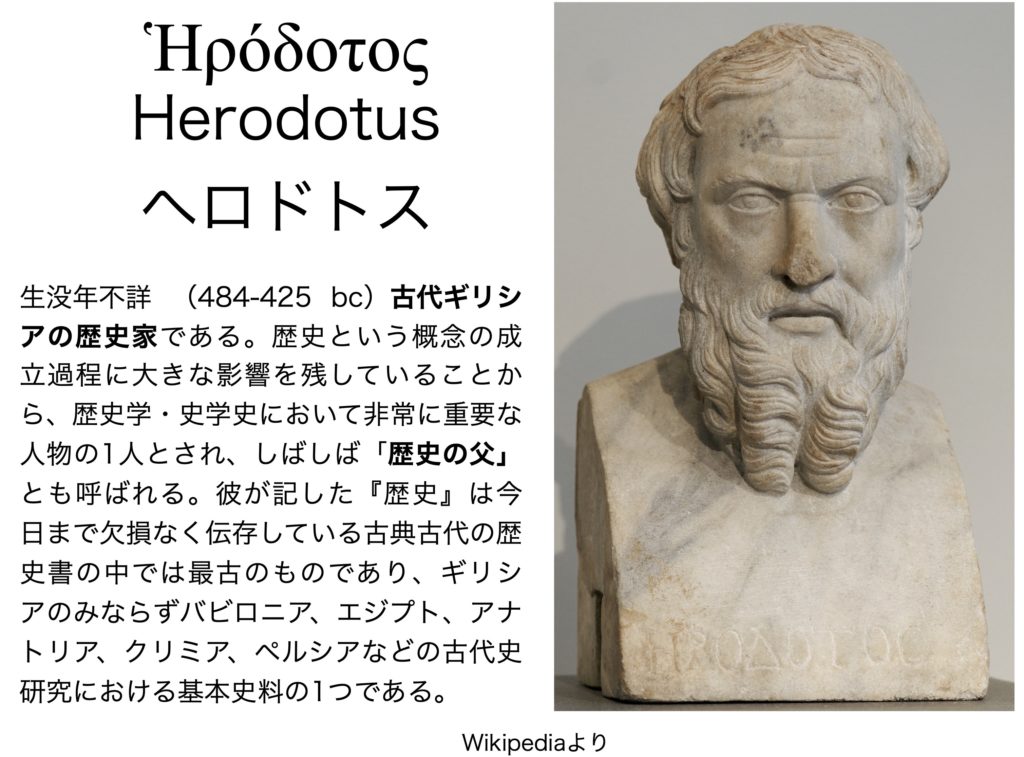ペルシャの大軍が迫り来る中、ベルシャザール王は何故その陥落の前夜に酒宴などを設けていたのでしょうか?

旧約聖書のダニエル書5章にはこの酒宴が設けられた経緯については記されていません。歴史的背景を知らずにこの箇所を読むとベルシャザール王の、イスラエルの神に対する不遜に対して神がいきなり裁きを下されたように読んでしまいます。間違った聖書の読み方とは言いませんが、歴史的背景を調べてみると人類歴史の文脈という中での神の働きを見ることができて興味深いです。
バビロン 陥落に関する3つの資料
- ナボニドゥス年代記
- ヘロドトスの「歴史」
- クセノフォン「クロスの教育」
ナボニドゥス年代記

[iii.12] and Sippar did not enter (Babylon). When Cyrus did battle at Opis on the [bank of] [iii.13] the Tigris against the army of Akkad, the people of Akkad [iii.14] retreated. He carried off the plunder (and) slaughtered the people. On the fourteenth day Sippar was captured without a battle. [iii.15] Nabonidus fled. On the sixteenth day, Ugbaru, governor of Gutium, and the army of Cyrus, without battle [iii.16] they entered Babylon. Afterwards, after Nabonidus retreated, he was captured in Babylon. Until the end of the month, the shield-(bearing troops) [iii.17] from Gutium surrounded the gates of Esagil. (But) interruption (of rites) in Esagil or the (other) temples [iii.18] there was not, and no date (for a performance) was missed. On the third day of the month Arahsamna, Cyrus entered Babylon. [iii.19] The harû-vessels were filled before him. There was peace in the city while Cyrus, (his) greeting to [iii.20] Babylon in its entirety spoke. Gubaru, his district officer, appointed the district officers in Babylon.
(和訳・私訳) シパールそして[バビロン ]に入らなかった。クロスがヂグリス川[の岸の]オピスでアカドの軍と戦った時、アカドの人々は退いた。彼は略奪物を持ち去り、人々を虐殺した。14日目にシパールは戦わずして捕らえられた。ナボニドゥスは逃げた。16日目にグティウムの知事ウグバルとクロスの軍は戦うことなくバビロンに入った。その後、ナボニドゥスが撤退した後、彼はバビロン で捕らえられた。その月の末までグティウムの盾を[かまえた軍勢]はエサギルの門を囲んだ。[しかし]エサギルの[儀式]や[他の]寺院の儀式を中断することはなく、儀式の日や[儀式]は欠かされることはなかった。アラサムナの月の3日目にクロスはバビロンに入った。儀式の(ハルー)器は彼のために注がれた。 クロスが挨拶をした間、バビロン の町中に平和があった。彼の地方長官ではるグバルはバビロンの役人達を任命した。
ヘロドトス「歴史」

Book 1. [190] [1] Then at the beginning of the following spring, when Cyrus had punished the Gyndes by dividing it among the three hundred and sixty canals, he marched against Babylon at last. The Babylonians sallied out and awaited him; and when he came near their city in his march, they engaged him, but they were beaten and driven inside the city. [2] There they had stored provisions enough for very many years, because they knew already that Cyrus was not a man of no ambitition, and saw that he attacked all nations alike; so now they were indifferent to the siege; and Cyrus did not know what to do, being so long delayed and gaining no advantage. [191] [1] Whether someone advised him in his difficulty, or whether he perceived for himself what to do, I do not know, but he did the following. [2] He posted his army at the place where the river goes into the city, and another part of it behind the city, where the river comes out of the city, and told his men to enter the city by the channel of the Euphrates when they saw it to be fordable. Having disposed them and given this command, he himself marched away with those of his army who could not fight; [3] and when he came to the lake, Cyrus dealt with it and with the river just as had the Babylonian queen: drawing off the river by a canal into the lake, which was a marsh, he made the stream sink until its former channel could be forded. [4] When this happened, the Persians who were posted with this objective made their way into Babylon by the channel of the Euphrates, which had now sunk to a depth of about the middle of a man’s thigh. [5] Now if the Babylonians had known beforehand or learned what Cyrus was up to, they would have let the Persians enter the city and have destroyed them utterly; for then they would have shut all the gates that opened on the river and mounted the walls that ran along the river banks, and so caught their enemies in a trap. [6] But as it was, the Persians took them unawares, and because of the great size of the city (those who dwell there say) those in the outer parts of it were overcome, but the inhabitants of the middle part knew nothing of it; all this time they were dancing and celebrating a holiday which happened to fall then, until they learned the truth only too well. — Herodotus. (1920). Herodotus, with an English translation by A. D. Godley. (A. D. Godley, Ed.). Medford, MA: Harvard University Press.
(和訳・私訳)第1巻 [190] [1] 次の年の春の初めに、クロスがギンデス(川)を360の運河に分割することによって治めた後、彼はついにバビロンを攻略した。 バビロン人たちは城外に出て待ち構えた。そして彼が街の近くまで進軍してきた時交戦した。しかし、彼らは破られ街の中に追い戻された。 [2] 城壁内には何年ももつ程の食料があった。それは(バビロンの人々が)クロスが野心をもった男で見境なく全ての国々を攻略することを知っていたから。そのため彼らはクロスの攻囲戦を平気に思った。クロスは長く包囲したが進展がないことで途方にくれた。[191] [1] 彼の困難の中で誰かが知恵を与えたか、本人自身が思いついたか、私には分からがいが、彼は次のことをした。[2] 彼は川が町に入るところに軍の一部を待機させ、軍のもう一部を川が町を出る裏側に待機させ、ユーフラテス川の水路を歩いて渡れる状況を待って町に入るよう指示した。 彼らのこの命令をして行かせた後、彼自身は軍隊の中で戦うことのできないものたちを引き連れ退却し、 [3] 湖に来た時、クロスはかつてバビロンの王妃が行ったように、(ユーフラテス)川から、その時は湿地になっていた湖に運河を引いて川の水を湖に流すことによって川の水位を落とし、川が歩いて渡れる状態にした。[4] こん時のために待機していたいたペルシャ人たちは、水位が男の太ももの高さまで水位が退いたユーフラテス川の水路を通ってバビロンに入った。[5] もしバビロニア人たちが事前にこのことやクロスの策略を知っていたなら、彼らは町に出入りする川の門を閉じ、水路の両側にある城壁の上から水路内に閉じ込めた敵であるペルシャ人たちを殲滅することができたに違いない。 [6] しかし実際の所、ペルシャ人たちは彼ら(バビロニア人)の不意を衝き、町の大きさ(と住人たちは言う)ゆえ、町の外側で征服が進んでいたにも関わらず、町の中心部の住民は全く気づかす、この現実を知らしめられた正にその時まで、その年のこの時の祭りで踊ったり祝ったりしていた。
クセノフォン「クロスの教育」

[9]“Chrysantas,” Cyrus answered, “let us not trouble ourselves with that which is beyond our powers; but we must apportion the work among ourselves as quickly as possible, to each contingent its proper share, and dig a ditch as wide and as deep as possible, so that we may require only as many men on guard as are absolutely indispensable.” [10] Accordingly, he took measurements in a circle round about the city, leaving just enough room by the river for the erection of large towers, and began on either side of the city to dig an immense trench; and the earth from it they threw up on their own side of the ditch. [11] First of all, he began to build towers by the river, laying his foundations with the trunks of date-palms not less than a hundred feet long—and they grow even taller than that. And they were good material for this purpose, for it is a well known fact that date-palms, when under heavy pressure, bend upward like the backs of pack-asses. [12] These he used as “mud-sills,” in order that, even if the river should break into his trench above, it might not carry his towers away. And he erected many other towers besides upon the breast-works of earth, so that he might have as many watch-towers as possible. [13] Thus, then, his men were employed, while the enemy upon the walls laughed his siege-works to scorn, in the belief that they had provisions enough for more than twenty years.Upon hearing of this, Cyrus divided his army into twelve parts as if intending each part to be responsible for sentry duty during one month of each year; [14] but the Babylonians, in their turn, when they heard of that, laughed much more scornfully still, at the thought of Phrygians and Lydians and Arabians and Cappadocians keeping guard against them, for they considered all these to be more friendly to them than to the Persians. [15] At last the ditches were completed. Then, when he heard that a certain festival had come round in Babylon, during which all Babylon was accustomed to drink and revel all night long, Cyrus took a large number of men, just as soon as it was dark, and opened up the heads of the trenches at the river. [16] As soon as that was done, the water flowed down through the ditches in the night, and the bed of the river, where it traversed the city, became passable for men. —- Xenophon. (1914). Xenophon in Seven Volumes, 5 and 6. (W. Miller, Trans.). Medford, MA: Harvard University Press, Cambridge, MA; William Heinemann, Ltd., London.
(和訳・私訳)[9]『クリサンタス」、とクロスは答えた。「我々の力の及ばないことについて思い煩わないようにしよう。しかし、我々はできるだけ早く我々の間で仕事の分担をしよう。それぞれの部隊にそれぞれの力に応じて、出来る限り広く深い溝を掘らせ、見張り兵を必要最小限の人数にしよう」。[10] この言葉に従って彼は街の周囲を円状に測量し、川沿いには大きな塔を複数建てるだけの広さを確保させた。そして、街の両側に巨大な溝を掘り始めさせ、掘り起こした土は自分たちの側に積み上げさせた。[11]先ず、彼は川沿いに複数の塔を建てさせ、その基礎に100フィート以上あるナツメヤシの幹を使わせた。この目的のためにはこれらは良い材料だった。これはよく知られている事だが、ナツメヤシは強い圧力を受けると、丁度荷運びのラバの背中のようにたわむ(が折れる事はない)。[12] このナツメヤシを丁度敷土台のように用い、例え川(の水)が彼が掘らせた溝に上から流れ込んでも塔を持ち去ることのないようにした。これ以外にも彼は多くの塔を、胸壁の土盛りの上に築き、出来るだけ多くの見張り塔を設けるようにした。[13] このように彼の部隊が労しているあいだ、敵は城壁の上からこの兵糧攻めのための作業を嘲笑っていた。それは、20年以上持ち堪えるだけの食糧を持っているという自信からであった。これを聞き、クロスはその兵を12部隊に分け、一年を12の月に分け、交代で歩哨勤務にあたらせると見せかけた。[14]するとこれを伝え聞いたバビロン人たちは、更に激しく嘲笑した。というのは、(ペルシャ軍にいる)ピルギア人、リディア人、アラビア人、カパドキア人が(元々)自分たちに友好的な人々であると考えていたからである。[15]遂に溝は完成した。その時、彼はバビロンで一年の内一晩中飲んだり騒いだりする祭りの日が回ってきたことを聞いたので、クロスは大勢の兵を伴い、丁度闇が訪れた時、(バビロンに流れ込む)川上で溝の始点を開いた。[16]そうするやいなや、川の水は暗闇の中で溝の方に流れ込み、街の中を流れる川の水面が下がり、(川の中を)人(兵)が歩けるようになった。
以上の資料をまとめるとおおよそ3つの可能性が考えられている;
- ベルシャザール王は市民のモラルを鼓舞するため(不落の城壁、水源、20年分以上の食料、などをよりどころとして)酒宴を設けた。
- 2日前にナボニドゥスが敗退したので、厳しい中でベルシャザールが王位につく祝いをして見せた。
- たまたま、年中行事の祭りの時が狙われた。
1. The celebration might have been observed to build morale and encourage his people. Such a display on Belshazzar’s part could have communicated to his people a sense of confidence. After all, the walls of the city seemed invincible, and the Euphrates River ran through the city; so there was an ample water supply. Herodotus reported that the city had been stocked with enough food to last for many years.
2. Shea offers another possible explanation for this seemingly inopportune feast. He believes that when news of Nabonidus’s defeat at Sippar fifty miles to the north and his subsequent flight (two days previous) were known in Babylon, Belshazzar moved quickly to proclaim himself the first ruler of the empire, the de facto king. Thus the festival was the celebration of Belshazzar’s coronation. In addition, Shea points out that a thousand Babylonian nobles participating in a party would be understandable for a coronation of a new king, but not for an ordinary social function.3.
3. Xenophon seems to indicate that the Babylonians were observing a customary festival that simply happened to fall at this time, and Herodotus appears to support this idea. Thus it may have been that an annual feast was in progress, and the Persians merely took advantage of the opportunity. A regular festival may have been celebrated in the usual manner in order to convey to the city’s inhabitants a sense of normalcy in spite of the chaotic conditions outside the walls.
Miller, S. R. (1994). Daniel (Vol. 18, pp. 151–152). Nashville: Broadman & Holman Publishers.